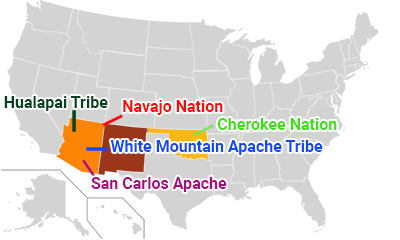Southwest Hub for American Indian Youth Suicide Prevention Research
Leadership
Contact Principal Investigator: Mary Cwik, PhD
Principal Investigators: Allison Barlow, PhD, MPH

Hub Activity Sites
White Mountain Apache Tribe
Navajo Nation
Cherokee Nation
Hualapai Tribe
San Carlos Apache Tribe
Project Overview
The mission of the Southwest Hub for American Indian Youth Suicide Prevention Research (Southwest Hub) is to establish a collaborative network of tribal leaders, investigators, interventionists, service providers, and service users in the Southwest region. Facilitated by Johns Hopkins Center for American Indian Health, this hub will bring together intellectual resources, cultural assets, and experiences to overcome the suicide disparity among American Indian youth. The primary goals of the Southwest Hub are to: (a) develop and test prevention strategies that can sustainably reduce the burden of youth suicide and promote resilience in Indigenous communities; (b) conduct outreach and dissemination to promote additional tribal community engagement in research activities; and (c) enable tribal leaders, providers, and policymakers to use science-based information to formulate mental health policies and programs to reduce suicide. A central focus of the Southwest Hub is to grow and evaluate tribal-specific surveillance, linked case management, and brief interventions to reduce risks and promote resilience. The broad strategy for addressing American Indian youth suicide prevention involves: (a) early identification of at-risk youth through tribally mandated surveillance; (b) case management and monitoring by caring community-based mental health workers to assess imminent risk and promote linkages to care; and (c) two brief interventions that first address imminent risk and promote linkages to mental health care, and second, teach youth culturally embedded protective factors to promote resilience.
Sequential Multiple Assignment Randomized Trial (SMART) Research Study
The White Mountain Apache Tribe and Johns Hopkins Center for American Indian Health have a more than 30-year research partnership. As part of this partnership, the tribe has sustained a community-wide tribally mandated suicide surveillance system, a central registry of all individuals who have experienced suicide ideation, suicidal behavior/attempt, binge substance use, or died by suicide on the reservation. In addition to surveillance, this research partnership has developed culturally tailored and sustainable prevention interventions: New Hope and Elders’ Resilience Curriculum. The goal of this research study is to apply a SMART design to understand how best to combine these interventions for youth ages 10-24 after a suicide attempt, ideation, or binge substance use.
Capacity Building
The Southwest Hub provides capacity building support to a cadre of local tribal governments, investigators, interventionists, and service providers across three states—Arizona, New Mexico and Oklahoma—to advance suicide prevention services and strategies in the White Mountain Apache Tribe, Navajo Nation, Cherokee Nation, Hualapai Tribe, and San Carlos Apache Tribe. Through this collaboration, the satellites sites (Cherokee Nation, Hualapai Tribe, and San Carlos Tribe) will be able to better identify at-risk youth and gather robust local data through surveillance and design supplementary services using community mental health workers to provide regular monitoring and brief interventions to close gaps in continuity of care. In addition, the satellite sites will also have access to trainings and resources developed by core research partners (White Mountain Apache Tribe and Navajo Nation) and convene regularly by phone and in person for shared learning, policy development, and dissemination of best practices.
Project Website: Coming soon
